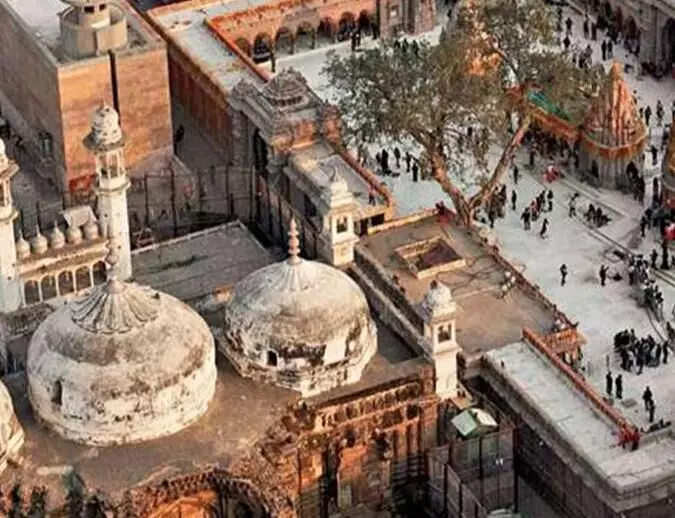
Assam CM tells voters need 400 LS seats to construct temple at Gyanvapi mosque site
text_fieldsVaranasi: The construction of a temple at the Gyanvapi mosque complex in Varanasi will be facilitated if voters ensure that the Bharatiya Janata Party-led National Democratic Alliance government wins at least 400 seats in the ongoing Lok Sabha elections, Assam Chief Minister Himanta Biswa Sarma urged voters to ensure on Friday.
After a report by the Archaeological Survey of India stated that a Hindu temple was demolished and rebuilt at the site in the 17th century, a Varanasi court on January 31 permitted Hindus to say prayers in the complex's basement, Scroll.in reported.
An appeal contesting the directive was later dismissed by the Allahabad High Court.
“We want to see a temple on the Gyanvapi site,” Sarma told voters during a rally at Barrackpore in West Bengal’s North 24 Parganas district on Friday. “We have to build Krishna Janmabhoomi [the birthplace of Hindu deity Krishna].”
The management committee of the mosque complex filed a plea, which the Supreme Court has consented to consider, contesting the Allahabad High Court's December ruling about the maintainability of the cases aimed at the "restoration" of a Hindu temple at the contested location.
“We also have to ensure that no Babri Masjid is built again on the Ram Mandir site,” Sarma also said on Friday.
The Babri Masjid, which was destroyed in December 1992 by Hindutva extremists who thought it marked the location of the Hindu deity Ram's birth, is the site of the Ram temple in Ayodhya. Nationwide rioting had been sparked by the incident.
On January 22, Modi oversaw the ceremony that marked the opening of the Ram temple.
Sarma continued by saying that there were "many unfinished tasks" in India and that Prime Minister Narendra Modi had been pleading with voters to give the National Democratic Alliance 400 members in the Lok Sabha. “We want to bring in the Uniform Civil Code in the country,” he said.
An ideological tenet of the BJP in power, the uniform civil code is a set of regulations that would apply to all citizens equally and govern marriage, divorce, succession, and adoption. With the exception of Uttarakhand and Goa, these personal issues of various religious and tribal communities are currently governed by community-specific rules that are mostly based on religious texts.
Sarma added that the West Bengal administration, led by Trinamool Congress chief Mamata Banerjee, would not be able to halt the state's implementation of the Citizenship Amendment Act.
Under the Citizenship Amendment Act, refugees from Bangladesh, Afghanistan, and Pakistan who belong to six minority religious communities—apart from Muslims—can apply for Indian citizenship more quickly if they arrive in the nation before December 31, 2014, and they must have stayed there for six years.
In December 2019, Parliament passed the Act. The Centre published the Act's regulations on March 11; the Act has drawn heavy criticism for its discriminatory treatment of Muslims. In 2019 and 2020, the law had provoked widespread protests around the nation.
Prime Minister Narendra Modi made similar comments at rallies in Madhya Pradesh and Maharashtra a few days before the chief minister's statement. Modi had stated on May 7 that the National Democratic Alliance needs more than 400 members in Parliament in order for the Congress to be unable to reinstall Article 370 in Jammu and Kashmir or place the "Babri lock" on the Ram temple in Ayodhya.
On August 5, 2019, the Centre revoked Article 370 of the Constitution, which granted the former state of Jammu and Kashmir special status.
At least three BJP leaders, Anantkumar Hegde, Jyoti Mirdha, and Lallu Singh, have alluded to significant constitutional amendments in the run-up to the Lok Sabha elections in the event that the Hindutva party wins a majority in both Houses of Parliament.
The opposition has claimed that the BJP wants to completely eliminate democratic elections and eliminate reservations in government employment and education by gaining an overwhelming majority in parliament.






















